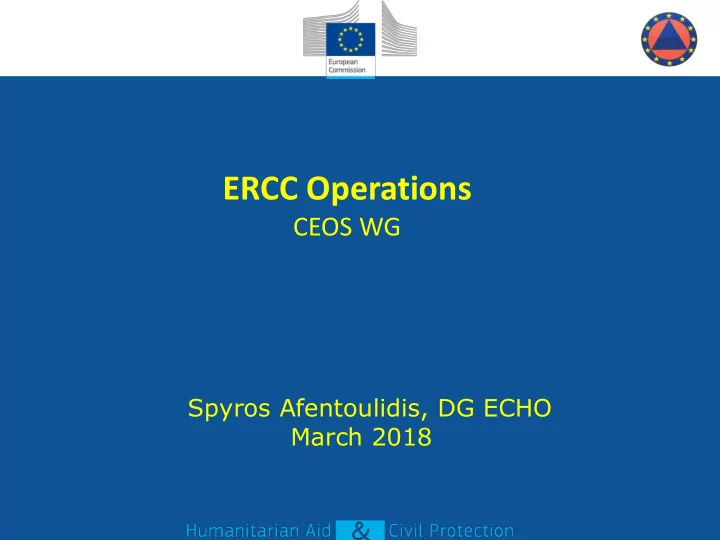

ERCC Operations CEOS WG Spyros Afentoulidis, DG ECHO March 2018
The ERCC's three main functions 1. Coordination of disaster response within the framework of Union Civil Protection Legislation 2. Coordination platform for humanitarian aid and civil protection operations 3. Commission and EU Crisis Coordination platform, including Solidarity Clause and the Integrated Political Crisis Response (IPCR) arrangements
Types of disasters covered by UCPM Natural disasters – Floods, earthquakes, forest fires, cyclones Manmade disasters – Environmental disasters – Complex emergencies (Iraq, Syria) Health emergencies – Ebola epidemic – Yellow Fever Assistance to consular support – Terrorist attacks (medical evacuation) – Evacuation of EU citizens
UCPM Response – Dominica
How does ERCC build its situational awareness? EU Civil Protection Teams ECHO Offices and EU Delegations Early Warning Systems (e.g. GDACS, EFAS, EFFIS) Scientific advice (e.g. ARISTOTLE, JRC) Copernicus Emergency Management Service (satellite maps) External reports (UN Agencies, Regional Agencies, National authorities) Analytical Team products Media
Copernicus
ERCC: Entry focal point For all Authorized Users For all Associated users For third parties' activation enquiries + interrelation with stakeholder upstream and downstream in the workflow
…but it also acts as a user as well, mainly: • Based on requests from the field (e.g. EUCPT, ECHO field offices) • Based on early warning systems
Main benefits of the EMS service • Rapid and credible support to national authorities and other enquiring parties • Preliminary assessment of situation in short time (especially when impact-based information is not abundant or reliable) • Adaptation to end user's requirements
Main steps to be taken by ERCC duty officers • Check validity of a request (Authorized User, scope, sensitivity, completeness, feasibility, duplication) • Request service provider to order imagery when request is validated • Inform relevant stakeholders • Check products before giving green light for dissemination 12
Scientific advice to operations
Analytical team support
INFO AND STATISTICS
Number of operations* of the EUCP Mechanism *Operations = any event open in CECIS (request for assistance, early warning (pre-alert), monitoring)
Requests for assistance inside and outside EU
Number of missions and experts deployed
Recommend
More recommend